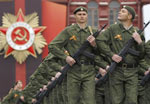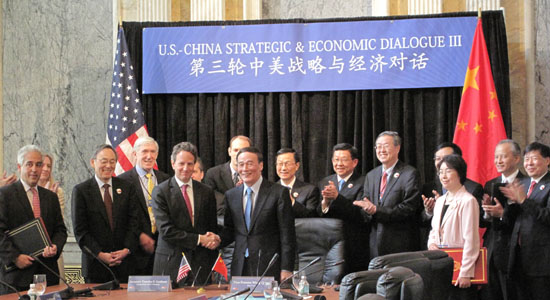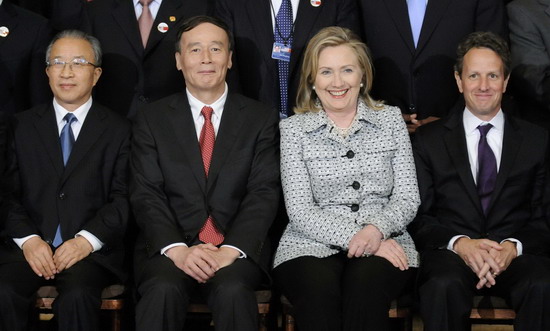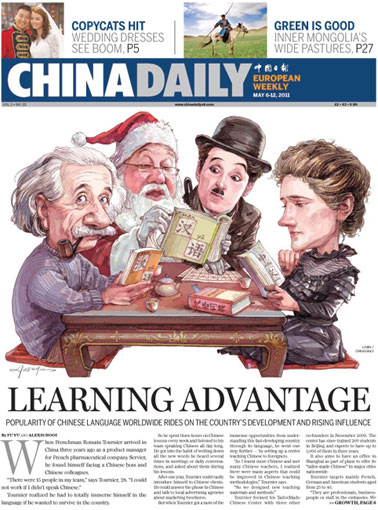Foreign and Military Affairs
Economic ties get boost with new deal
Updated: 2011-05-10 23:27
By Li Xing (China Daily)
WASHINGTON - China and the United States signed an agreement to boost economic ties, and promote sustainable growth, during their Strategic and Economic Dialogue.
Zhang Xiaoqiang, deputy head of the National Development and Reform Commission, said The Comprehensive Framework for Promoting Strong, Sustainable, and Balanced Growth and Economic Cooperation can help open up new areas of cooperation and help develop new growth models for both countries.
|
||||
US President Barack Obama met with Vice-Premier Wang Qishan and State Councilor Dai Bingguo, who were leading the Chinese team, after the talks on Monday.
Both countries need to build "a cooperative partnership that is comprehensive in scope, cooperative in nature, and yields positive achievements that benefit our people", according to the White House website.
The leaders discussed a broad range of issues, including the economy and security, human rights and nonproliferation efforts in Iran and the Democratic People's Republic of Korea.
US Secretary of State Hillary Clinton and Treasury Secretary Timothy Geithner, who co-chair the economic and strategic tracks of the annual talks respectively, and Vice-President Joe Biden, along with Chinese officials, attended the meeting with Obama in the evening.
A senior US official, who declined to be named, described the first day's talks as "candid and honest".
He said having senior military officers at the talks for the first time contributed to long-term strategic trust between China and the US and their two militaries.
Both countries recognize that many of the most sensitive security issues are crosscutting in nature and important to both the civilian and military parts of government.
"By tackling some of those sensitive issues together, we hope we can break down misunderstanding and misperceptions that could potentially lead to some sort of miscalculation," he said.
Most of the discussions were held behind closed doors and it was unclear what breakthroughs could be achieved. But the measure of success for the Washington talks would be specific progress on issues of contention, Clinton said.
Chinese experts welcomed the military talks.
It is reported that General Ma Xiaotian, deputy chief of the general staff of the People's Liberation Army, Michle Flournoy, US under secretary of defense for policy, and US Four-Star Admiral, Robert Willard, participated in the security talks,
Tao Wenzhao, a scholar on American studies at the Chinese Academy of Social Sciences (CASS), said the high-level security talks show the significance of the meeting for both countries.
Fan Jishe, an expert on US studies at CASS, said the US has been pressing China to increase military transparency, spurred by worries he described as overreaction.
But the two militaries have been seeking to improve relations and this is reflected by the talks, he said.
"But they still have major differences. China insists that both sides have strategic trust before talks, and the US says talks can generate trust," Fan said.
The Washington Post on Tuesday spoke positively on the presence of Chinese military officers, saying "the US government has been frustrated in the past with its inability to get China's military to discuss some strategic issues such as nuclear weapons".
On the sidelines of the talks, Wang Qishan appeared on a television interview and said that most of the US media did not cover China deeply and showed a bias when they did.
He told The Charlie Rose Show that his biggest worry is that China's economic relationship with the US will be strangled by politics.
"We face a lot of opportunities. If economic issues ... become political ones, such opportunities of cooperation may well be lost," he said.
State Councilor Dai Bingguo said in an article published in the Wall Street Journal on Monday that China's development is good for America.
"China has never thought of vying for leading position in the world. We have had more than enough of tough days. The only thing we want is that, with our hard work and wisdom, plus the cooperation and exchanges with other countries, we can lift the Chinese people out of poverty," he wrote.
Li Xiaokun and Cheng Guangjin in Beijing contributed to this story.
|
|
E-paper

War of the roses
European Chinese rose growers are beating their Chinese rivals at their own game
Preview of the coming issue
High-tech park gets big boost
At the source
Specials

Sino-US Dialogue
China and the US hold the third round of the Strategic and Economic Dialogue on May 9-10 in Washington.

Drunk driving
Drunk drivers face a detention for one to six months and a revokation of their drivers' license.

V-Day parade
A military parade marking the 66th anniversary of the Soviet victory over Nazi.



